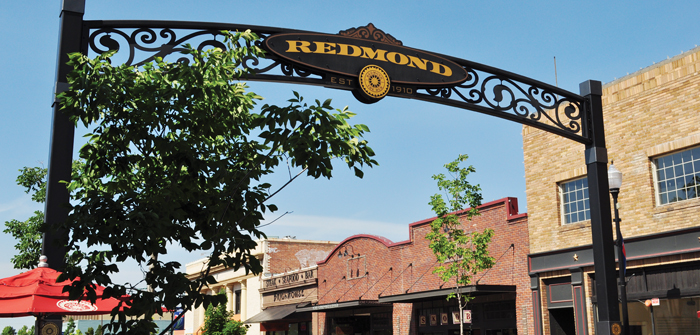2014 was a banner year for Redmond with Redmond Economic Development (REDI) investing in numerous workforce development programs and initiatives resulting in assisting 142 different organizations, adding 227 new jobs with estimated $10 million in gross annual wages and nearly $8 million in direct capital investment.
At the REDI Annual Luncheon recently we heard two similar perspectives on the state of economic development efforts in Redmond. Allison Larsen, principal with TadZo Consulting (a site selection and economic development strategy firm) shared her view from the outside based upon her visit to Redmond. Bill Smith, owner/developer of the Old Mill District, gave a compelling talk on Redmond’s opportunities.
Larsen offered insight on what businesses are looking for in a location site and how Redmond can be competitive in targeting perspective companies including minimizing risk, ensuring the resources for a business to have long term success, available workforce so the business can continue to grow, incentives, location, transportation options, real estate, utilities and infrastructure and permit and regulation rules.
Redmond was given a grade for each component receiving all As and Bs…with an overall view that Redmond has a lot to offer new and emerging companies. Here’s a quick summary:
Location – A: Redmond is well suited with access to market, proximity to supplies and connection to global markets.
Transportation – A: It’s all good from highways, local roads, air service and rail. The airport is outstanding with a number of carriers, Highway 97 is a preferred truck route with several trucking firms here, railways serve capacity and smart use of Prineville’s short line.
Real Estate – A-: Quality buildings, shovel ready and certified land, competitive cost and an amazing amount of industrial sites. However, Redmond doesn’t have a lot of completed buildings and companies are expecting that a building is available.
Utilities – B+: high quality water, adequate waste water capacity, new investment in utility stations, diverse energy portfolio and competitive utility rates.
Permitting & Regulatory Environment – A+: Redmond provides a positive environment for development saying yes to the process and finding a solution suggesting even better options in pre-development meetings, providing concierge services and constant input from the development community to improve the process.
Business Climate – A-: Redmond has positive local official involvement and leadership, ample vision for the community, residents know of REDI and understand the value, government and public support for growth. Everyone is really working well together with proactive planning and active local business outreach. Would have greater opportunity if business owners and managers lived in Redmond, they could drive more change.
Human Capital – B: availability of various skill levels as required, ability to recruit from outside, competitive wages, work ethic, labor relations and training. But with a tightening labor market is Redmond creating a pipeline quick enough? With education budget constraints are high school career programs sustainable? Is Redmond willing to continue to invest in education? Where are the future workers? There are also limitations to housing availability.
Entrepreneurship & Innovation Resources – A-: Larsen is impressed with what is happening with Redmond. Usually with a community like Bend next door they don’t have what Redmond has including Opportunity Knocks, Grow Oregon, SCORE, Stable of Experts through EDCO. There is a lack of incubator or accelerator space.
Sustainability – B+: How green is the community, is it promoting green concepts? Companies expect green programs, diverse energy portfolios, energy conservation incentives and infill development.
Incentives – B-: Redmond has hands on assistance to capitalize on state incentive programs but is it really competitive or simply leveling the playing field? Redmond might have more than you think if packaged creatively looking at new sources.
Redmond is doing exceptional well at economic development. But this is no time to rest on your laurels says Larsen because there are hungry competitors. Redmond needs to make the local companies happy, build those relationships, continue to stay on top of the skills needed with relocation packages.
She added that one of the best things Redmond has going for it is that: Jon Stark, director of REDI, is not being scooped away because he’s doing a great job and the board is active.
Her final push is for Redmond to step up to the plate with marketing: it’s pathetic she suggested with a current budget of only $6,000 they need a minimum of $40,000 to develop a strategic and targeted plan. Redmond is ‘Open for Business” but so is every competitor and they need to creatively express it.
Keynote speaker Bill Smith also had glowing thoughts on Redmond’s potential. The developer of over one million square feet of retail space in Bend looked at Redmond through the winds of his experiences stating that Redmond has done a better job of growing than Bend.
Smith asked why do we all work here: quality of life for our families and whether they can make a living in Central Oregon…if there weren’t enough jobs for his kids he wouldn’t be here. He offered that the reason that Central Oregon has a good economic reputation has a lot to do with traded sector jobs (products that are sold outside the area), but tourism is way more important than we give it credit for. Destination Resorts bring visitors and those visitors bring their companies here.
Smith summed up Redmond:
Strengths: attitude, airport, Eagle Crest, fairgrounds, schools, adequate open land, parks, public official relationships with the state, COCC advanced manufacturing technology education. Smith said the strengths that we have in Redmond made it easy getting the UGB expanded, “and it is not because Bend is bad, no its because Bend is not as good as Redmond.”
Weaknesses: Oregon land use laws, rock (costs so much money to move), property tax rate, development standards, distance to markets and the boom bust cycle we are constantly in.
Threats: Oregon land use laws, education funding, transportation infrastructure statewide, (we need the crossing on the Columbia for transportation), resting on our laurels and water laws.
Opportunities: great attitude, railroads, business clusters, tourism, stability on school board, water, adequate land, development standards and fairgrounds. Smith said the city needs to support the fairgrounds more. The land next to the fairgrounds held by the city could be developed into a regional sports center.
Smith concluded stating that “if Redmond stirs all of this together, you don’t really need to do much, just keep doing what you’re doing and if you want to be faster and better, give Dan Despotopulos (director of Deschutes County Fair & Expo Center) more money, help COCC and don’t let Jon Stark get recruited.”





